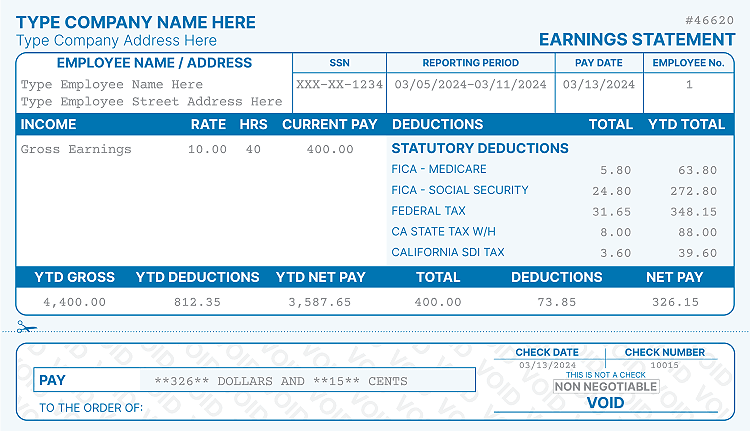Deductions on a Pay Stub - Common Payroll Withholdings & Deductions
While employers are not required to provide pay stubs, they are still required to keep track of wages paid, withhold required deductions, remit withholdings to the State and Federal government, and provide employees with a W-2 for the previous tax year. Considering businesses already have this information, it seems strange they wouldn’t want to provide a pay stub to answer any pay questions their employees will undoubtedly have.
A pay stub is similar to a receipt with the gross pay earned, deductions, and net pay for the pay period. Payroll deductions are wages or salaries an employer withholds from an employee's paychecks for government income taxes, court-ordered garnishments, and benefits.
This article will explain the different types of deductions commonly found on pay stubs.
Mandatory Deductions
Employers are required by law to withhold payroll taxes and remit them to the different levels of government and agencies. They may also be required by a court or government agency to garnish an employee's paycheck due to outstanding debts and taxes. Below are the commonly found mandatory pay stub deductions.
Pretax Deductions

Pretax deductions are deductions made from an employee's paycheck before taxes are deducted. Pretax deductions lower taxable income and the amount owing to the government since they are deducted from gross pay for taxation purposes. They also reduce your FUTA and state unemployment insurance contributions.
Health insurance, group-term life insurance, and retirement plans are all examples of pre-tax deductions. Employees are not forced to engage, although it is frequently in their best interests. They can save a lot of money by making pre-tax contributions instead of paying for benefits and other services after-tax.
However, the savings are not infinite. There are frequent limits on how much employees may donate pretax. For example, each year, the IRS restricts the total amount that may be deferred pretax to a 401(k)-retirement plan.
Federal Insurance Contributions Act
Federal Insurance Contributions Act (FICA) includes both Social Security and Medicare taxes. Both the employer and employee contribute equally to these payroll taxes. The Social Security paycheck deduction is 6.2% of the employee's gross earnings for the pay period. Once an employee has earned up to the Social Security wage base of $160,200 in a given tax year, they are no longer required to pay the Social Security tax above this amount for the remainder of the tax year.
Medicare tax paycheck deduction is 1.45% of an employee's gross earnings for the pay period. Unlike Social Security, the medicare tax has no wage base, and employees and employers must pay 1.45% on all taxable earnings. Employees have an additional .9% added to their medicare tax deduction for taxable earnings greater than $200,000 per year. Employers are not required to pay this additional amount.
Statutory Deductions
Government entities require statutory deductions to pay for public programs and services. They are composed of the federal income tax, the FICA tax (Medicare and Social Security) and the state income tax. You must first understand your workers' job status to properly file them.
You normally do not have to withhold income tax, Social Security tax, or Medicare tax from the salaries of independent contractors. This is because these employees must pay self-employment tax on their earnings.
On the other hand, if someone is a genuine employee, you must deduct the appropriate taxes. You can get more help from the IRS by submitting Form SS-8, Determination of Worker Status for Federal Employment Taxes, and Income Tax Withholding.
Federal Income Taxes
Employers are required to withhold federal income tax from each employee’s paychecks and remit to the federal government's Internal Revenue Service (IRS). Federal Tax rates are progressive, meaning employees pay higher federal income taxes as their gross taxable earnings increase. The progressive tax system is separated into seven different tax brackets depending on the status of the tax filer. It includes single filers, married filing separately, head of household, and married filing jointly.
State Income Tax
Employers must withhold state income taxes from their employee's paychecks and remit them to their respective State governments. There are 9 US States with no State income tax. Given this, employees in these states do not have State income tax deducted from their paychecks, including
- Alaska,
- Florida,
- Nevada,
- New Hampshire,
- South Dakota,
- Tennessee,
- Texas,
- Washington,
- Wyoming.
Each State has its individual income tax rates and brackets that employers will use to determine how much State income tax to withhold from their employee's paychecks and remit to the State government.
Local Income Tax
Local income tax, also known as municipal tax, is an income tax certain local governments impose on taxpayers who live or work in a specified area. However, local governments can only impose a local income tax in US States where State income tax is imposed. Depending on the local government, the local income tax can be an employee income tax and, or an employer tax.
Garnishments
Wage or salary garnishments are when an employer is legally required by either a court or a government agency to withhold a specific amount or percentage of earnings from each paycheck. Paycheck garnishments may be due to unpaid debts due to various reasons, such as outstanding child support, taxes, unpaid credit card balances, medical bills, and so on.
Federal and State laws offer employees some protection around the garnishment process. However, employers and employees should be aware of these laws to ensure they operate within the law and their rights are protected.
Union Dues
Employers with employees who are union members must deduct union dues from their pay stubs each pay period and remit directly to the respective union(s). In addition, even after a collective agreement with a union has ended, employers are still required to deduct union dues from their employee's paychecks and remit directly to the respective union(s).
Voluntary Deductions
Voluntary deductions are for those additional employee benefits or programs an employer may offer its employees. Below are common voluntary deductions from employee pay stubs and paychecks.
Post-tax deductions

After all statutory taxes have been withheld, post-tax deductions are deducted from an employee's paycheck. Post-tax deductions do not reduce the individual's overall tax burden since they cut net compensation rather than gross income.
Roth IRA retirement plans, disability insurance, union dues, charitable donations, and wage garnishments are all common instances. Employees can opt-out of all post-tax deductions except wage garnishments.
Health and Dental Insurance Premiums
Employers may offer optional health and dental insurance for their employees. The employer would then deduct the premiums from the employee's paycheck each pay period. Employers will typically also pay a portion of the health insurance premiums.
Life Insurance Premiums
Employees may also have the option to enroll in a life insurance policy. The life insurance premiums would be deducted from the employee's paycheck for each pay period, and the employer may pay a percentage of the life insurance premium on behalf of the employee.
Other Insurance Premiums
Employees may also have the option to opt into other insurance products available through the employer, such as supplemental life insurance, dependent life insurance, and accidental death and dismemberment. The premiums for these insurance policies would also be deducted from an employee's pay cheque for the pay period.
Retirement Plans
Employees can choose to deduct a percentage of their income each pay period and have it deposited into a retirement account such as a 401k or Registered Retirement Pension Plan (RRSP).
Pensions
Employers can offer a Defined Benefit Contribution Pension or a Defined Benefit Pension. The Defined Benefit Contribution Pension does not have a defined pension amount paid out at retirement. This type of pension plan typically has an employer contributing to an employee's retirement funds, such as an RRSP or 401k. Often, the contribution amount will be a percentage of the employee's income or match an employee's contribution up to a certain amount.
A Defined Benefit Pension plan promises a specific monthly payment each month during retirement. There are various ways employers calculate the defined benefit pension contributions employees will pay through payroll deductions and how much the employer will need to contribute.
Other
It is common for employers to deduct job-related expenses from their employee's paychecks. This can include uniforms, a personal portion of a work cell phone, and reimbursements to the employer for personal expenses inadvertently charged and paid for by the employer.
Frequently Asked Questions about Payroll Deduction
What Are Pay Stub Deduction Codes?
Here are some of the most common pay stub deduction abbreviations and codes you should know:
- State, SIT, or SWT: State income tax withholding
- FICA: FICA taxes paid for Medicare and Social Security
- FED, FIT, or FWT: Federal income tax withholding
- INS: Insurance deductions for other coverage, such as life insurance
- YTD: Year-to-date
- MED: Insurance deductions for health, vision, or dental insurance
- FSA or HSA: Contributions into a flexible spending account (FSA) or a health savings account (HSA)
- 401(k) or RET: 401(k) contributions into a retirement plan
What deductions are taken from a paycheck?
Each employee will have different mandatory and voluntary payroll deductions depending on the company they work for, what State, in what municipality, and more. However, an employee can expect to have the following mandatory deductions from their gross pay: federal income taxes, state income taxes, local taxes, social security tax, and medicare tax. Voluntary payroll deductions can include retirement funds, pensions, health and dental insurance, and other insurance products.
What are the 4 most common payroll deductions?
The four most common payroll deductions are the mandatory deductions for Federal income tax, state income tax, social security tax, and medicare tax.
What are the 3 types of payroll deductions?
Payroll deductions can be classified into these 3 types:
- Mandatory deductions: Federal and state income tax, FICA taxes, and wage garnishments.
- Voluntary deductions: Life insurance, job-related expenses and retirement plans.
- Post-tax deductions: Garnishments, Roth IRA retirement plans and charitable donations.
What are some uncommon payroll deductions?
Here are some of the most overlooked tax deductions. Claim them if you are entitled to them, and you will have extra money in your pocket.
- Out-of-pocket charitable donations
- State sales taxes
- Student loan interest paid by you or someone else
- Reinvested dividends
- Refinancing mortgage points
- Moving expenditures
- Child and Dependent Care Tax Credit
- EITC (Earned Income Tax Credit)
- Jury pay paid to the employer
- State tax you paid last spring
How is Federal income tax calculated?
Federal income taxes are calculated based on the taxpayer's total taxable income multiplied by one or more of the seven federal tax brackets. Federal Income tax rates progressively increase as a taxpayer's taxable income increases.
Kristen Larson is a payroll specialist with over 10 years of experience in the field. She received her Bachelor's degree in Business Administration from the University of Minnesota. Kristen has dedicated her career to helping organizations effectively manage their payroll processes with Real Check Stubs.

